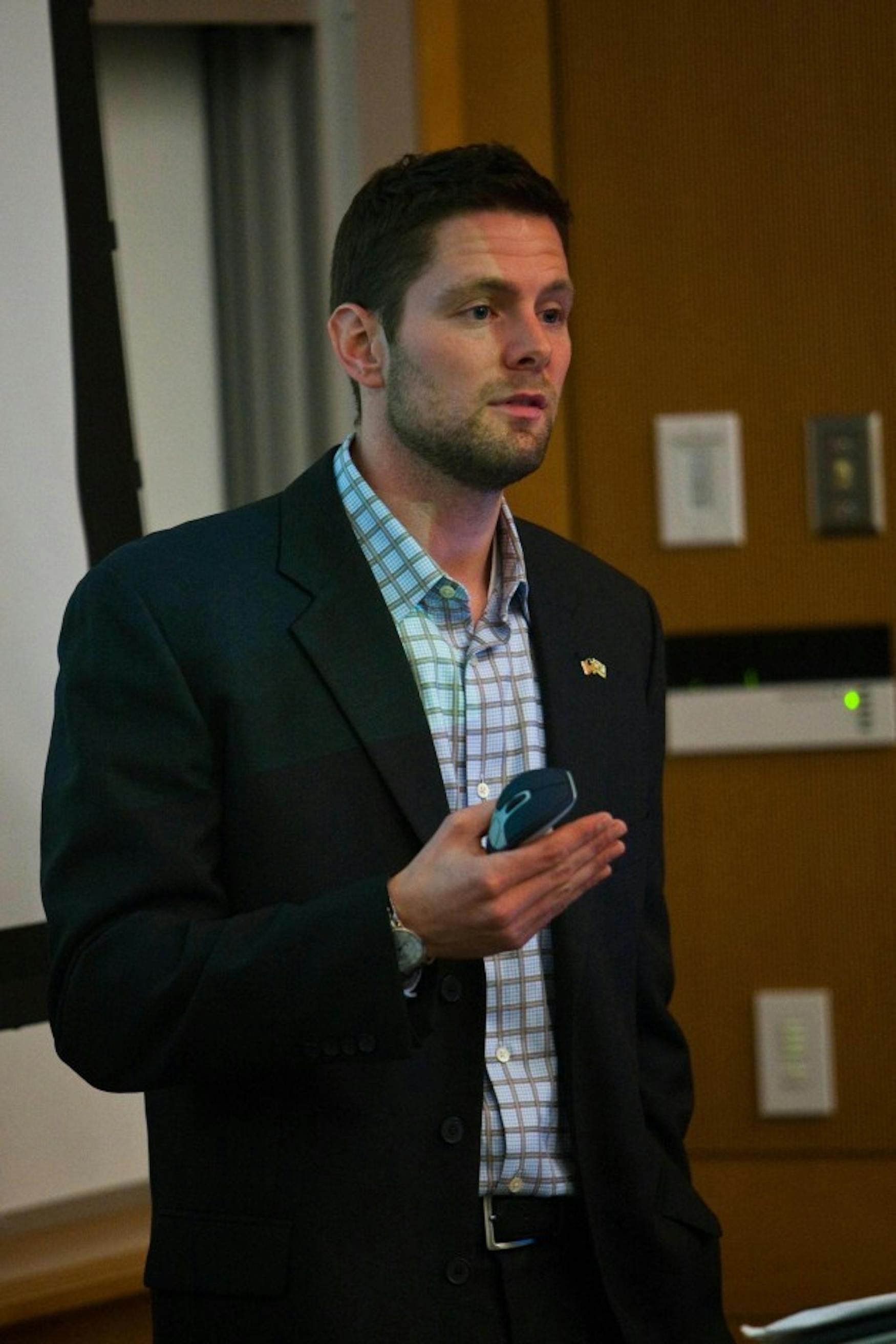Soldier discusses army ethics
Former Israeli Defense Forces Sgt. Nadav Weinberg spoke at a discussion this past Wednesday. In "Experiences Serving in the IDF and a Look Inside the Region's Tensions," Weinberg described his firsthand accounts of his experience in the military.
The discussion was hosted by the Committee for Accuracy in Middle East Reporting in America and Brandeis Israel Public Affairs Committee.
Weinberg, who graduated magna cum laude in Economics and finance from Case Western University in 2008, opted out of a job on Wall Street to serve in the IDF. Weinberg is a member of Orev Nachal, a special forces unit in the Nachal Brigade.
The Nachal Brigade specializes in counter-terrorism warfare. The process for acceptance into Orev Nachal involved a four-day tryout called the Gibush.
In Weinberg's specific case, more than 400 people started these tryouts, 120 finished but only 70 were accepted.
After being accepted Weinberg still had to go through 17 additional months of training.
To give the audience some perspective on the intentions, but the serious manner of the IDF, Weinberg showed pictures from his swearing-in ceremony. In one hand he held an M-16 gun, and in the other he held a copy of the Hebrew Bible.
Weinberg explained that the ethics of the IDF were considered and rethought in 1992 when Israel realized and admitted to having made some serious mistakes.
Ruach Tzahal, or "The Spirit of the IDF," a code that outlines the general ethical codes and laws that the soldiers should hold themselves to, outlines three core values: responsibility, human dignity and human life.
According to Weinberg, each soldier should characterize their actions by involvement, initiative and diligence; is obligated to preserve human dignity; and is to bear in mind the "supreme value of human life."
Weinberg went on to explain the difference between the freewill service system in America and the conscription service system in Israel and the complications that come with handing every eligible Israeli citizen-turned soldier a firearm.
In America, the system for those who want to serve the country is solely volunteer-based unless there is a draft. In Israel, there is a conscription service in place, a compulsory enlistment to service.
Next, he spoke about the ethical conduct of the IDF and some problems that he and his friends encountered with unethical war conduct involving the IDF and Hamas.
The audience was encouraged to participate throughout Weinberg's presentation. He came up with various role-playing situations in which he asked each audience member to put him or herself in the place of a soldier.
He then acted as a civilian or terrorist and asked each person on whether or not they would shoot or what measures they would take. At the end of his lecture, Weinberg opened the floor for audience questions.
Some of the questions asked involved Weinberg reflecting on what it is like when he is referred to as a traitor for not serving in the American forces, how he responds to situations in which members of his brigade commit immoral acts, and how he would feel if a child saw him shoot at a terrorist target.
He responded to the questions asking the audience if his life was not worth as much as that of a child and explained that he had never run into a situation in which any solider he knew was committing immoral acts.
To end his discussion, Weinberg referenced a 60 Minutes segment reflecting on the justifiable losses in terrorist-to-civilian loss ratios. In America, the current ratio of acceptable loss is 1 terrorist for every 30 civilians.
In Israel this number used to be 1 terrorist for every 1 civilian, but now is at 1 terrorist for every 12 civilians. "[The IDF] are not perfect, and we are not ever completely without fault," Weinberg said.
"You hear a lot of generalizations that Israel has the best army in the world, they are so ethical, and they do the best that they can; but to get the personal story of someone who was in the army helps," said Sarah Jaffe '15 after the event.
"It makes you feel good to hear about their faults and their opinions. It makes it all more real because it helps to justify the generalizations," she continued.
When asked what her favorite part of the presentation was, and what the most shocking part was, Talia Holtzman '15 noted, "When he asked us how we would react to certain situations, about whether or not we would shoot a civilian, it just made me think that I have no idea what I would do in this situation. It must be really hard for them to be in these types of situations several times a day."
Jaffe also added, "You think the terrorists are the bad guys and the civilians are the good guys. You never think of how much grey area there is or how much it intertwines."
Both students noted that this presentation made them respect what our soldiers do for civilians much more than they did before the event.



Please note All comments are eligible for publication in The Justice.